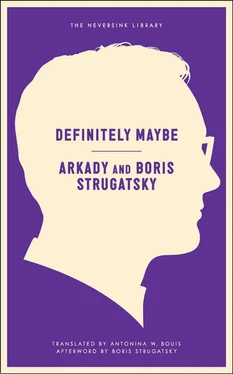“They killed Snegovoi! It’s easy for you to talk, Philip, they don’t have you by the throat, you’re all right!”
Vecherovsky nodded.
“Yes,” he said. “I’m all right. I’m all right, and Vladlen here is all right, too. Right, Vladlen?”
The little cozy man with the bunny-rabbit eyes behind the strong glasses in steel frames spread his hands again in silence. Then he stood up and, avoiding everyone’s eyes, said:
“Excuse me, friends, but it’s time for me to go. It’s getting late.”
Excerpt 15…. “Do you want to spend the night at my place?” Vecherovsky asked.
Malianov was washing the dishes and thinking over the offer. Vecherovsky wasn’t rushing him for a reply. He went back into the room, moved around in there for a while, and then returned with a mound of garbage in a soggy newspaper, which he threw into the garbage can. Then he picked up a towel and wiped off the kitchen table.
Actually, after all of the day’s events and conversations, Malianov didn’t feel like being alone. On the other hand, it wasn’t very nice to abandon the apartment and run off; it was almost shameful. It’ll look like they managed to run me out after all, he thought. And I hate sleeping over, even at friends’ houses. Even at Vecherovsky’s. He suddenly smelled the aroma of coffee. That pink cup, as delicate as a rose petal, and in it—the magical elixir à la Vecherovsky. But when you think about it, you don’t drink that at bedtime. He could have coffee in the morning.
He washed the last saucer, put it into the drainer, wiped up the puddle on the linoleum haphazardly, and went into his room. Vecherovsky was in the armchair, facing the window. The sky was golden pink and the new moon was perched just above the high-rise building, like on a minaret. Malianov turned his chair to the window and sat down. They were separated by the desk, which Vecherovsky had cleared up: the notebooks were in an orderly pile, there wasn’t even a trace of the week’s supply of dust, and the three pencils and the pen were neatly lined up by the calendar. While Malianov had done the dishes, Vecherovsky managed to make the room sparkle—all it lacked was a vacuuming—yet he remained elegant, suave, and without a single spot on his creamy suit. He didn’t even get sweaty, which was absolutely fantastic. While Malianov, even though he had worn Irina’s apron, had a wet belly, like Weingarten’s. If a woman’s belly is wet after doing the dishes, it means her husband is a drunkard. But what if the husband’s belly is wet?
They sat in silence, watching the lights go out one by one in the twelve-story building. Kaliam showed up, mewing softly; he hopped up into Vecherovsky’s lap and began purring. Vecherovsky petted him with his long, narrow hand without taking his eyes off the lights in the window.
“He sheds,” Malianov warned.
“No matter,” Vecherovsky replied softly.
They fell silent once again. Now, when there was no sweaty Weingarten or terrified Zakhar with that abominable child of his or that ordinary yet mysterious Glukhov, when there was only Vecherovsky, infinitely calm and infinitely self-confident and not expecting any supernatural decisions from anyone—now it all seemed like a dream, or even some bizarre fairy tale. If it had actually happened, well, it was long ago, and it didn’t actually happen, it stopped just before it started. Malianov even sensed a vague interest in that semifictional hero: Did he get sentenced to fifteen years or was it all…
Excerpt 16…. remembered Snegovoi and the gun in his pajamas and the seal on the door.
“Listen,” I said, “did they really kill Snegovoi?”
“Who?” Vecherovsky answered after a pause.
“Well, uh,” I began and stopped.
“Snegovoi, judging by everything, shot himself,” Vecherovsky said. “He couldn’t stand it.”
“Couldn’t stand what?”
“The pressure. He made his choice.”
Now it wasn’t a bizarre fairy tale. I felt that familiar fear inside and I tucked my feet under me on the chair and hugged my knees. I curled up so tight my muscles crackled. It was me and it was happening to me. Not to Ivan the Tsarevich, not to Ivan the Wise Fool—not to any fairy-tale hero—but to me. Vecherovsky could talk, he was safe.
“Listen,” I said through clenched teeth. “What’s with you and Glukhov? That was a strange conversation you two had.”
“He made me angry.”
“How?”
Vecherovsky didn’t answer right away.
“He doesn’t dare be alone,” he said.
“I don’t understand,” I said after some thought.
“What gets me is not how he made his choice,” Vecherovsky said slowly, as though thinking aloud. “But why keep justifying his action? And not simply justifying it, but trying to convince others to follow him. He’s ashamed to be weak among strong people, and he wants you to be weak too. He thinks that it will be easier for him. Maybe he’s even right, but that attitude of his infuriates me.”
I listened to him, mouth wide open, and when he was through, I asked:
“Do you mean that Glukhov is also… under pressure?”
“He was under pressure. He’s simply squashed now.”
“Wait a minute.”
Vecherovsky turned his face to me slowly:
“You didn’t understand?”
“What do you mean? He said… I heard him with my own ears… I mean, you can see, simply, that he hadn’t dreamed or imagined… it’s obvious!”
But it didn’t seem so obvious to me anymore. On the contrary.
“Then you didn’t understand,” Vecherovsky said, looking at me with curiosity. “Zakhar did.” He got his pipe for the first time that evening and calmly started filling it. “Strange that you didn’t understand. Well, you were obviously upset. Judge for yourself: The man loves mysteries, loves watching television, his favorite show is on today, but for some reason he rushed over to visit with total strangers—for what? To complain about his headaches?” He struck a match and lit his pipe. An orange flame danced in his eyes. He sucked on the pipe. “And then, I recognized him right away. Actually, not right away. He’s changed considerably. He was a live wire—energetic, excitable, sarcastic. None of this Rousseauism and no vodka drinking. First I just felt sorry for him, but when he started singing the praises of his new philosophy, I got mad.”
He concentrated on his pipe.
I rolled up into a tighter ball. So that’s how it was. The man had been squashed. He was still alive but no longer the same man. Broken flesh, broken spirit. What did they do to him that he couldn’t take it? But there must be pressures, I guess, that no man can take.
“So, you mean you condemn Snegovoi, too?” I asked.
“I don’t condemn anyone,” Vecherovsky countered.
“Well… you’re incensed by Glukhov.”
“You didn’t understand,” Vecherovsky said with some impatience. “I’m not incensed by Glukhov’s choice. What right have I to be incensed by a choice made by a man left one on one, without help, without hope. I’m annoyed by Glukhov’s behavior after his decision. I repeat: He’s ashamed of his choice and that’s why—and only because of that—he’s trying to convert others to his faith. In other words, because of his self-image he’s adding to the already unbearable pressure he feels. Understand?”
“With my mind, yes.”
I wanted to add that Glukhov was completely understandable and if he could be understood, he could be forgiven, that Glukhov was beyond the realm of analysis, in a realm where only compassion was applicable, but I realized that I didn’t have the strength to talk. I was shivering. Without help and without hope. Without help and without hope. Why me? What for? What did I do to them? I had to hold up my end of the conversation, and I said, clenching my teeth after every word:
Читать дальше












